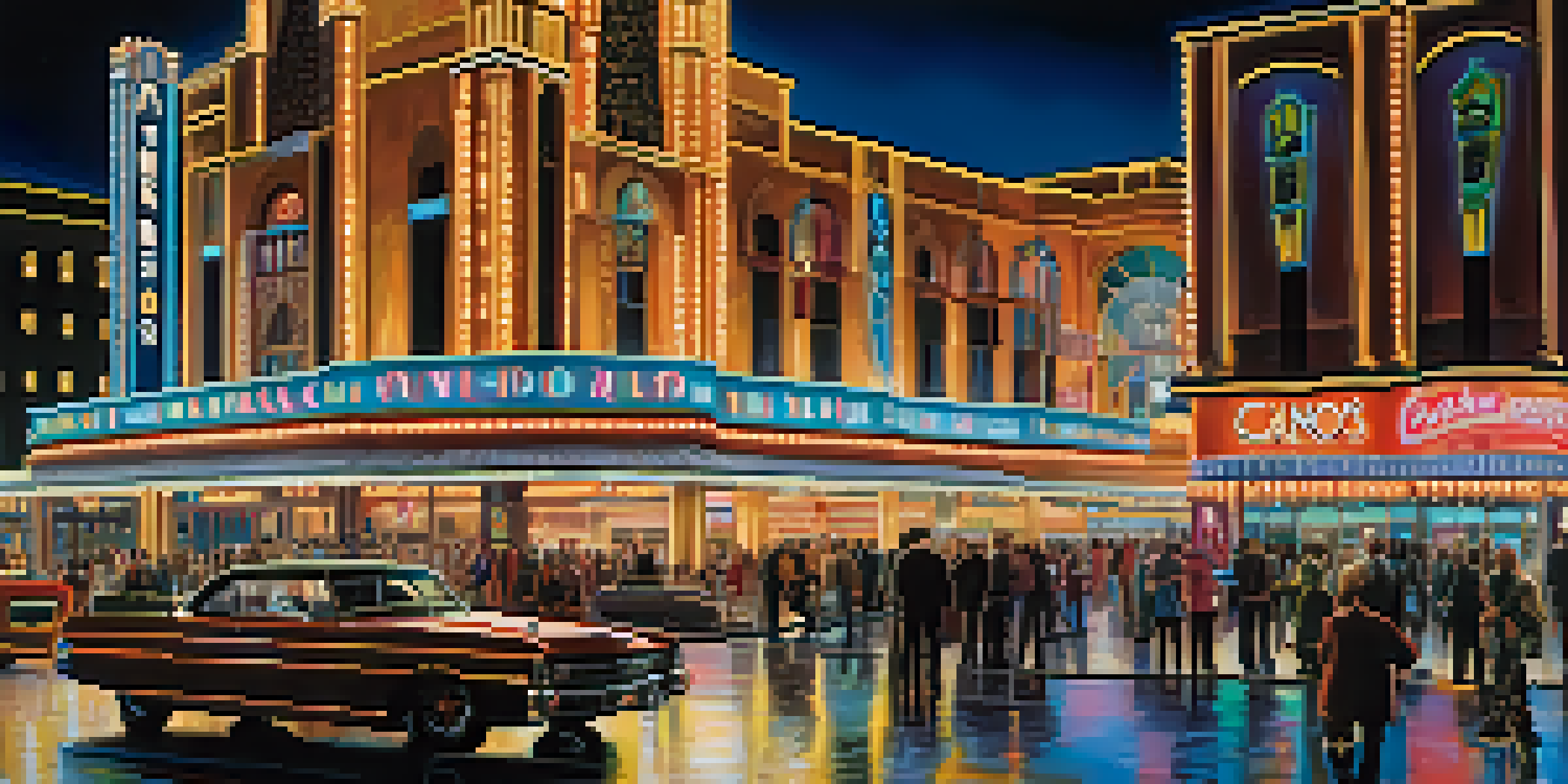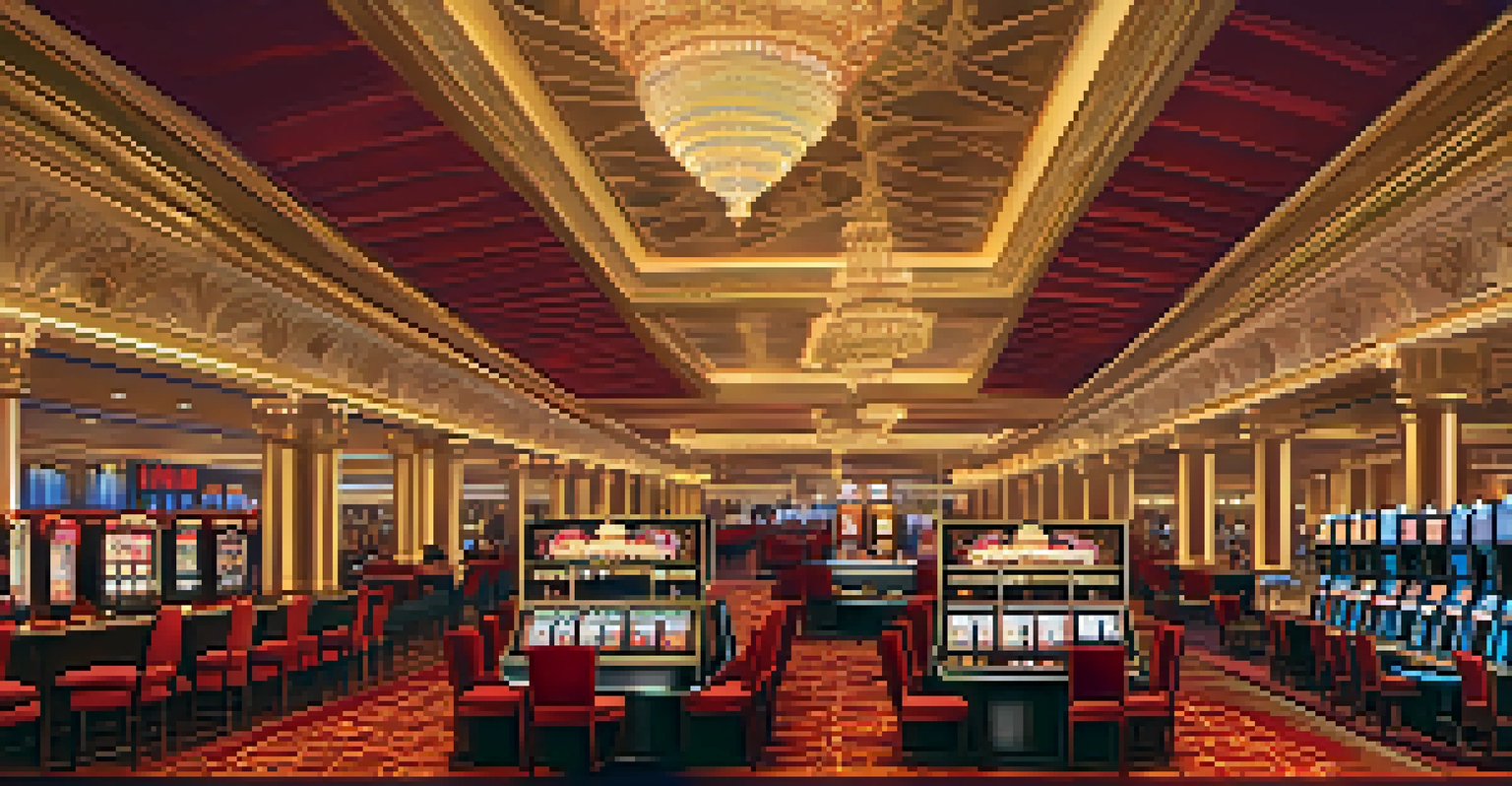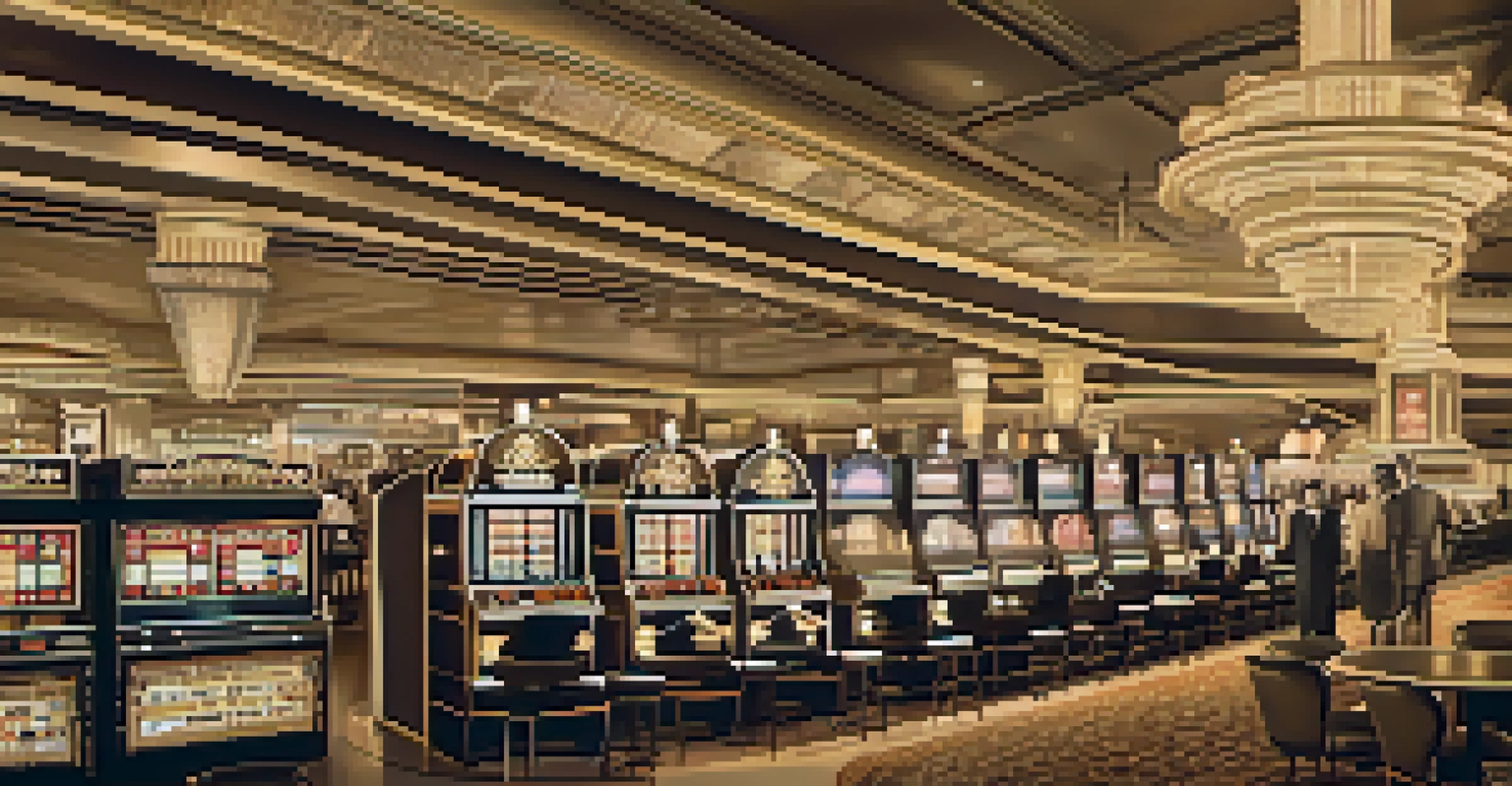Reno's Historical Significance: The Birth of Modern Casinos

Reno: The Gateway to Gaming in America
Reno, often dubbed 'The Biggest Little City in the World,' is a pivotal player in the evolution of American gaming. In the early 20th century, it emerged as a prime destination for those seeking entertainment and chance, particularly during the Great Depression. The city's strategic location near California made it a convenient escape for gamblers and tourists alike, laying the groundwork for what would become a nationwide fascination with casinos.
Reno is the place where gambling is not just a game, but a way of life.
The passage of the Nevada Gaming Control Act in 1955 solidified Reno's reputation as a gaming hub. This legislation not only regulated the burgeoning casino industry but also attracted major casino operators to the area. By establishing a framework for fair play and responsible gaming, Reno differentiated itself from other gambling locales and positioned itself as a leader in the gaming sector.
As the first city in Nevada to legalize gambling, Reno set the stage for a cultural shift in how Americans viewed casinos. This acceptance paved the way for the later explosion of Las Vegas as a gaming mecca. Reno's historical significance is evident in its pioneering role in shaping the modern casino landscape we know today.
The Early Casinos: A New Era of Entertainment
The first casinos in Reno, such as the Golden Hotel, opened their doors in the 1930s, marking the beginning of a new era of entertainment. These establishments offered not just gambling but also luxurious dining and vibrant nightlife, enticing visitors from all over. The blend of gaming and entertainment created a unique experience that would soon spread across the country.

Reno's early casinos were characterized by their opulence and charm, drawing in celebrities and high rollers. The city became a hotspot for social gatherings, where people could indulge in games of chance and enjoy live performances. This combination of glamour and excitement laid the groundwork for the larger-than-life casino experiences that would follow in Las Vegas.
Reno: Birthplace of Modern Casinos
Reno played a crucial role in shaping the American gaming landscape, pioneering legal frameworks and entertainment models that influenced future casino developments.
As Reno's casinos flourished, they also sparked a cultural phenomenon, influencing fashion, music, and social interactions of the time. This era saw the rise of iconic performers and a vibrant nightlife that became synonymous with casino culture. Reno's casinos not only provided financial opportunities but also transformed the city's identity into a premier entertainment destination.
The Impact of Legal Changes on Casino Development
In the 1960s, legal changes in Nevada catalyzed a massive growth spurt for Reno's casino industry. The introduction of new gaming regulations encouraged investment and innovation, leading to the construction of larger, more elaborate casinos. This shift not only improved the quality of gaming experiences but also attracted a broader audience, including families and tourists.
The allure of Reno is not just in the games, but in the stories that unfold around them.
Reno's casinos began to diversify their offerings, incorporating amenities like hotels, restaurants, and entertainment venues. This transformation reflected a growing understanding that successful casinos needed to appeal to a wider demographic. The evolution of the casino experience in Reno laid the groundwork for similar expansions in other gaming cities across the United States.
As these changes took effect, Reno positioned itself as a forward-thinking city, embracing modernization while honoring its historical roots. The combination of legal reforms and innovative casino concepts helped Reno maintain its status as a prominent player in the gaming industry. These developments not only influenced Reno but also set trends for casino operations nationwide.
The Rise of Mega-Casinos in Reno
The 1980s and 1990s ushered in an era of mega-casinos in Reno, transforming the city's skyline and gaming landscape. Properties like the Atlantis and the Peppermill emerged, offering expansive gaming floors and luxury accommodations. These developments reflected a shift toward a more resort-style approach to gambling, aiming to provide a comprehensive experience for visitors.
With the rise of mega-casinos, Reno attracted not just gamblers but also families and leisure travelers. The inclusion of amenities such as spas, shopping, and entertainment options appealed to a diverse audience, making Reno a year-round destination. This transformation marked a significant departure from the traditional view of casinos as mere gambling venues.
Rise of Mega-Casinos Transformed Reno
The emergence of mega-casinos in the 1980s and 1990s shifted Reno's image from a gambling hub to a comprehensive entertainment destination.
The mega-casino trend in Reno also sparked competition, prompting existing establishments to revamp their offerings. This push for innovation and improvement led to the overall enhancement of the gaming experience in the city. Reno's evolution into a destination for entertainment beyond just gaming has solidified its place in the modern casino landscape.
Reno's Cultural Influence on Gambling
Beyond its casinos, Reno's cultural influence on gambling has been profound and far-reaching. From movies to music, the city's gaming scene has inspired numerous artists and entertainers. Reno's unique blend of charm and excitement has become synonymous with the American gambling experience, often depicted in popular media.
The city has also been a backdrop for countless stories, capturing the allure and risks associated with gambling. This cultural representation has helped shape public perception of casinos, emphasizing both the thrill of winning and the dangers of addiction. As a result, Reno has become a symbol of the complex relationship Americans have with gambling.
Reno's cultural impact extends to gaming tournaments and events that draw participants from around the world. These gatherings celebrate not only the games themselves but also the vibrant community surrounding them. The city's role as a cultural hub for gambling continues to thrive, influencing trends and shaping the future of the industry.
Modern Challenges Facing Reno's Casino Industry
Despite its rich history, Reno's casino industry faces modern challenges that threaten its once-dominant position. Increased competition from other gaming destinations, particularly Las Vegas and online gambling platforms, has put pressure on Reno to innovate. To remain relevant, casinos in the city must continually adapt to changing consumer preferences and technological advancements.
Additionally, economic fluctuations and shifts in tourism have posed significant challenges for Reno's casinos. The COVID-19 pandemic, for example, drastically impacted visitor numbers, forcing many establishments to rethink their strategies. As the industry recovers, casinos must find ways to attract both new and returning visitors while ensuring a safe and enjoyable experience.
Modern Challenges for Reno's Casinos
Reno's casino industry faces increasing competition and economic fluctuations, necessitating innovation and adaptation to attract visitors.
To combat these challenges, Reno's casinos are focusing on enhancing customer experiences and diversifying their offerings. This includes investments in technology, improved amenities, and unique entertainment options. By embracing change and innovation, Reno aims to preserve its historical significance while securing its future in the ever-evolving gaming landscape.
Reno's Legacy: A Blueprint for Future Casinos
Reno's legacy as a pioneer in the casino industry serves as a blueprint for future developments in gaming. The city's history of innovation and adaptation has shaped the way casinos operate today and will continue to influence emerging markets. As new gambling destinations emerge, they often look to Reno's successes and challenges for guidance.
The lessons learned from Reno's evolution—from the early days of gaming to the rise of mega-casinos—highlight the importance of understanding customer needs. Future casinos can draw inspiration from Reno's commitment to providing diverse experiences that cater to a wide range of visitors. This adaptability is crucial for thriving in a competitive landscape.

Ultimately, Reno's historical significance in the birth of modern casinos is not just about its past; it's a living legacy that continues to evolve. As the gaming industry progresses, Reno will likely remain a touchstone for innovation and cultural influence in the world of casinos. Its story is a testament to the enduring allure of gambling and the cities that embrace it.